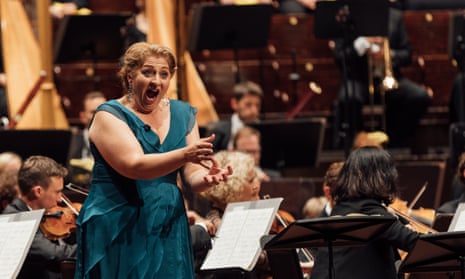This was the culmination of Edinburgh international festival’s four-year Ring cycle in concert and as such one of the hottest tickets at this year’s EIF. Such anticipation can lead to disappointment, but this proved to be an event that lived up to its hype. Andrew Davis and the Royal Scottish National Orchestra, the partnership behind the lauded Walküre at the 2017 festival, once again took to the Usher Hall stage for the final instalment of Wagner’s epic music drama. Apparently, the original intention was to have a different orchestra-conductor partnership for each opera but so successful was the Davis-RSNO collaboration in Walküre that they got the call up for Götterdämmerung.
Many of the singers had likewise appeared in previous instalments, but none was more central to the success of the performance than soprano Christine Goerke. Having scaled the heights of the complete Ring cycle at the Metropolitan Opera earlier this year, Goerke is the Brünnhilde of the moment. It’s not difficult to see why. Her luminous soprano has the vocal strength to surmount the mighty Wagnerian orchestra without sounding forced or harsh. Allied with genuine dramatic capabilities, hers is an all-too-human account of the warrior goddess, a seductive combination of pathos and power.
Goerke’s may have been the standout performance but there was plenty of interest elsewhere, particularly Ain Anger’s splendidly world-weary, implacable Hagen and Karen Cargill in the dual roles of Waltraute and Second Norn. Greek soprano Danae Kontora, who made an impression as a last-minute stand-in Woodbird in Siegfried, returned in her own right as an equally flirtatious Rhinemaiden. Burkhard Fritz, a new addition to the cast, was a solid although rather soft-toned Siegfried.
Wagner in the concert hall can be as much symphony as opera but Andrew Davis’s coolly measured controlled approach ensured that the performance was never static or self-indulgent. It might have been a little restrained for those who like their Wagner swooning and swooping, but its elegant pacing brought life to the light and shade of the music; the ecstatic outpourings sudden and exciting. Under his direction a vibrant, energised RSNO gave a burnished, nuanced account of the score.
At the close of the EIF, it was a timely reminder that at their best festivals can foster artistic partnerships to create something truly outstanding.
Broadcast on BBC Radio 3 on 21 September.
